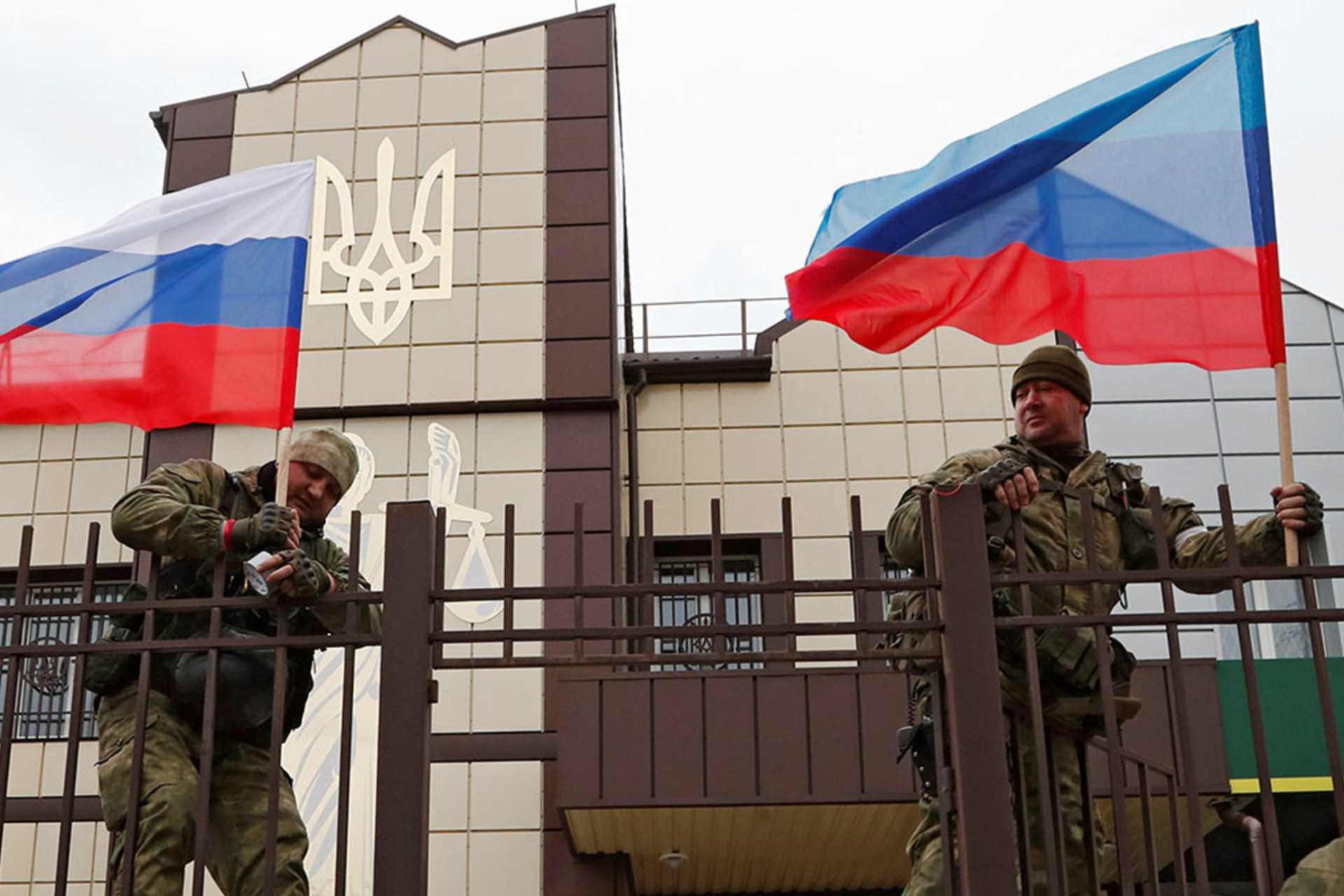How Russia’s Invasion of Ukraine Violates International Law
Russia’s invasion of Ukraine violates the UN Charter and cannot be justified under international law as an act of self-defense or humanitarian intervention.

By experts and staff
- Published
Experts
![]() By John B. Bellinger IIIAdjunct Senior Fellow for International and National Security Law
By John B. Bellinger IIIAdjunct Senior Fellow for International and National Security Law
An Illegal Invasion
Russia’s invasion of Ukraine violates Article 2(4) of the UN Charter, a central tenet of the charter that requires UN member states to refrain from the “use of force against the territorial integrity or political independence of any state.”
The suggestion by President Vladimir Putin and other Russian officials that Russia’s use of force is justified under Article 51 of the UN Charter has no support in fact or law. Article 51 provides that “nothing in the present charter shall impair the inherent right of individual or collective self-defense if an armed attack occurs against a member of the United Nations.” However, Ukraine did not commit or threaten to commit an armed attack against Russia or any other UN member state. Even if Russia could show that Ukraine had committed or planned to commit attacks on Russians in the Ukrainian regions of Donetsk and Luhansk, Article 51 would not permit an action in collective self-defense, because Donetsk and Luhansk are not UN member states. Indeed, they do not even qualify as states under international law, despite their purported secession from Ukraine and Russia’s recognition of them as independent.
Putin’s statements that Ukraine was committing “genocide” against Russians in Donetsk and Luhansk, although a thinly veiled effort to justify Russia’s use of force in the language of international law, are also not supported by the facts and would not, in any case, give Russia a right to launch an invasion of Ukraine. The Genocide Convention defines genocide as certain, specified actions intended to destroy in whole or in part a national, ethnic, racial, or religious group. There is no evidence that Ukraine engaged in any of the defined actions and certainly no evidence of an intent to destroy in whole or in part any group in eastern Ukraine. Even if the Ukrainian government had committed human rights abuses against Russians in eastern Ukraine, neither the Genocide Convention nor the UN Charter authorizes convention parties or UN member states to use force to remedy acts of genocide or serious human rights abuses.
A Suspect Secession
Russia’s recognition of Donetsk and Luhansk as independent states last week was inconsistent with international law governing state sovereignty and secession. In general, international law requires respect for the territorial integrity of states and does not permit regions of states to declare independence and secede. Some international law experts believe that so-called remedial secession is permissible as a last resort when a people have suffered grave human rights abuses at the hands of the state government and have been unable to exercise internal self-determination, but this is a minority view and few (if any) lawyers are likely to argue that secession by Donetsk and Luhansk was justified in this case.
Russia’s Playbook
Russia’s actions appear to be a replay of its moves in Crimea in 2014, when it annexed Crimea after the region declared itself independent from Ukraine in a referendum. The United States and most European countries do not accept Russia’s annexation of Crimea and consider Russia to be unlawfully occupying part of Ukraine. Russia has not yet annexed Donetsk and Luhansk but could do so in the future. Even if Russia does not annex the regions, very few other UN members are likely to recognize them as independent states. If Russia does annex them, the United States and most European countries will likely consider the regions to be unlawfully occupied by Russia.
Russia previously recognized two regions of Georgia as independent states—South Ossetia and Abkhazia—after they declared their independence in 2008. Only four other UN member states—Nauru, Nicaragua, Syria, and Venezuela—recognize the regions as independent. In contrast, Russia rejected Kosovo’s 2008 declaration of independence from Serbia, claiming that Kosovars were not a distinct people and did not qualify for remedial secession. Ninety-seven UN member states have since recognized Kosovo as an independent state. The United States and many European countries support Kosovo’s independence but argue that its situation is unique and that it did not set a precedent for any other territorial secessions.
International Institutions Respond to Russia’s Actions
In addition to financial sanctions imposed bilaterally by the United States and numerous other countries, Russia is likely to face widespread condemnation and isolation in international bodies. Very few governments and law experts will believe that Russia’s actions are permissible under international law. On Friday, the Council of Europe suspended Russia’s participation in its Committee of Ministers and its Parliamentary Assembly. Meanwhile, the UN Security Council voted on a binding resolution condemning the invasion and requiring Russia to cease its military actions and withdraw from Ukraine. But Russia, as a permanent member of the Security Council, vetoed the resolution.
On Sunday, the Security Council voted 11-1 (with Russia opposed and three members abstaining) on a nonbinding resolution calling on the UN General Assembly to hold an emergency special session to consider Russia’s actions. This Security Council resolution comports with UN General Assembly Resolution 377(V) of 1950 (the so-called Uniting for Peace resolution), which resolved that in the case of a deadlock in the Security Council, the General Assembly shall “consider the matter immediately with a view to making recommendations to members for collective measures.” The General Assembly is likely to overwhelmingly adopt a resolution opposing Russia’s actions as a threat to Ukraine’s territorial integrity, sovereignty, and political independence, as it did in 2014 after Russia annexed Crimea. The General Assembly could also mandate a UN investigation of Russia’s actions, urge member states to impose sanctions on Russia, or recommend that Russia be expelled or suspended from certain UN bodies.
In addition, Ukraine also filed another claim against Russia in the International Court of Justice (ICJ) on Sunday, alleging that Russia misinterpreted the Genocide Convention to justify the invasion of Ukraine. The ICJ is already hearing two claims Ukraine filed in 2017 relating to Russia’s actions in Crimea and eastern Ukraine. Putin and other Russian officials could face an investigation by the ICJ for war crimes committed during the invasion. Although Russia is not a party to the Rome Statute, which established the International Criminal Court (ICC), Ukraine has accepted the ICC’s jurisdiction for offenses that have occurred on its territory since 2013 (other than the crime of aggression, for which the ICC does not have jurisdiction for nonparties).
